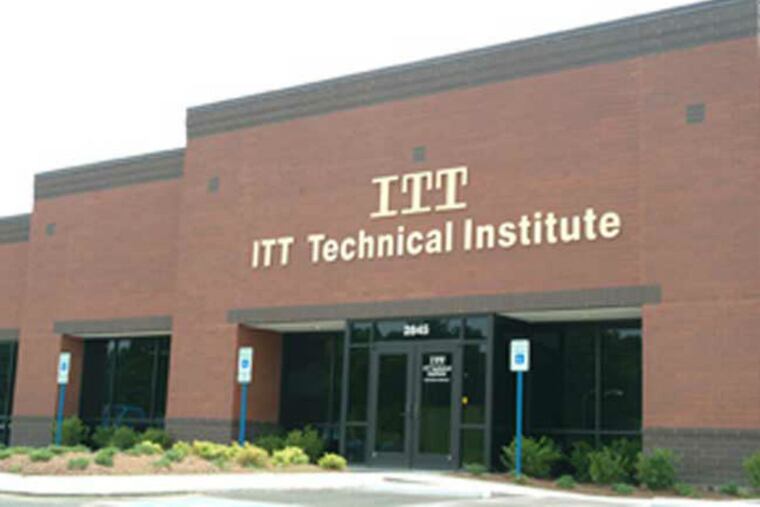Whom did the U.S. protect with ITT Tech move?
Tuition loans to U.S. college students have more than doubled since President Obama took office. Grads and dropouts owe $1.3 trillion, up more than $90 million each year, the Federal Reserve says.

Tuition loans to U.S. college students have more than doubled since President Obama took office. Grads and dropouts owe $1.3 trillion, up more than $90 million each year, the Federal Reserve says.
More than six million Americans are late or have stopped paying their college loans. Partly that's because the government has run its taxpayer-backed loan programs in a nonjudgmental way that is unusual in American finance.
To buy a house or a car, banks want you to have a job, ready cash, and a history of paying your bills.
But with kids, and taxpayer-backed loans, we've been less demanding. "The government doesn't do traditional underwriting. It's just, 'If you want to go to college, fill out this application and we'll lend you the money,' " Bruce Van Saun, CEO of Citizens Financial Group, which owns Citizens Bank, told me earlier this year.
It's a "noble intention," he said, but the result would put a private company out of business, or drive up prices: More than 12 percent of government student loans default, compared with 2 percent for bank student loans.
Can this go on? A sign it might not: last week's collapse of ITT Technical Institute. The for-profit college, which taught electronics, computer-based design, criminal justice, and other careers to more than 30,000 Americans, including nearly 3,000 at its Center City, Levittown and Plymouth Meeting classrooms, plus hundreds more in Marlton, closed Wednesday and let go 8,000 staffers.
The school, which had collected more than $5 billion in U.S. aid and student loans since 2007, pulled the plug after the government finally said no. The government said it may write off loans for current students. ITT's failure could cost taxpayers more than $500 million.
Why? According to ITT's annual student report, 96 percent of its students received federal loans or grants, but only 36 percent of full-time students were completing their programs, and only 11 percent of part-time students stayed more than a year. Too many failed students weren't paying their loans.
The U.S. Department of Education, after what it said were plenty of warnings, got tough: It demanded that ITT put up more collateral to cover loan defaults, which ITT couldn't afford.
Don't blame us, ITT's bosses said: The Education Department's decision to stop giving the school and its students money "was inappropriate and unconstitutional."
Is this a hard but righteous ending? Did the government finally step up to protect taxpayers and students?
It's not that simple, said Albert Lord, the Philadelphia native (and Penn State grad and trustee) who ran Sallie Mae for most of its history as a for-profit company, retiring in 2013.
"We used to do a fair amount of business with ITT. We ultimately stopped," in 2011, Lord told me. "They were a serious player. But with ITT, we could not get the loan defaults under control."
Yet Lord is reluctant to credit the government with doing the right thing for the right reason. Democrats, including education leaders in the Obama administration and Congress, tend to be "wary" of for-profit schools on principle, Lord said. But nonprofit colleges, which relentlessly boost tuition to stuff their pockets from the same ever-growing fountain of loans, face less restraint.
Lenders who managed government loans before the Obama administration took over direct student lending were warned not to cherry-pick students whose studies and family histories suggested they would be more likely to pay their bills, Lord said. "If we were to question a student's major or a student's track record, you could be censured for that."
With all the payment-
forbearance programs under the Obama administration, "too many students see this as a handout," Lord told me. Students who are good credit risks can end up paying more to cover students who aren't likely to pay back their loans.
Sallie Mae under Lord outraged liberal Democrats, who saw him and other executives getting rich on stock grants and government-backed loan repayments.
But Lord said the government's ensuing loan losses show that only private lenders have the persistence "to keep student loans alive until [borrowers] realize the value of their education. You can't write them off in the first few years. You have to stick with them."
Despite ITT's failure, Lord said for-profit school students are still a good credit risk, if parents or partners co-sign the loans - or if the schools agree to partly guarantee student loans against loss.
That turns the schools from potential subsidy hogs into partners, with extra incentive to help students earn their credentials and find work. "You need to share the risk," Lord concludes.
ITT has been directing Philadelphia-area students to similar programs at community colleges, state and private schools, and such competitors as DeVry University.
"We would welcome ITT Tech students for our fall term that starts Oct. 4," said Samuel Hirsch, vice president for student affairs at Community College of Philadelphia. A "Fast Track to Enrollment for ITT Students Day" is set for 9 a.m. to 5 p.m. Tuesday at the main campus, 17th Street below Spring Garden. The online application address: http://www.ccp.edu/forms/itt-students.
215-854-5194@PhillyJoeD